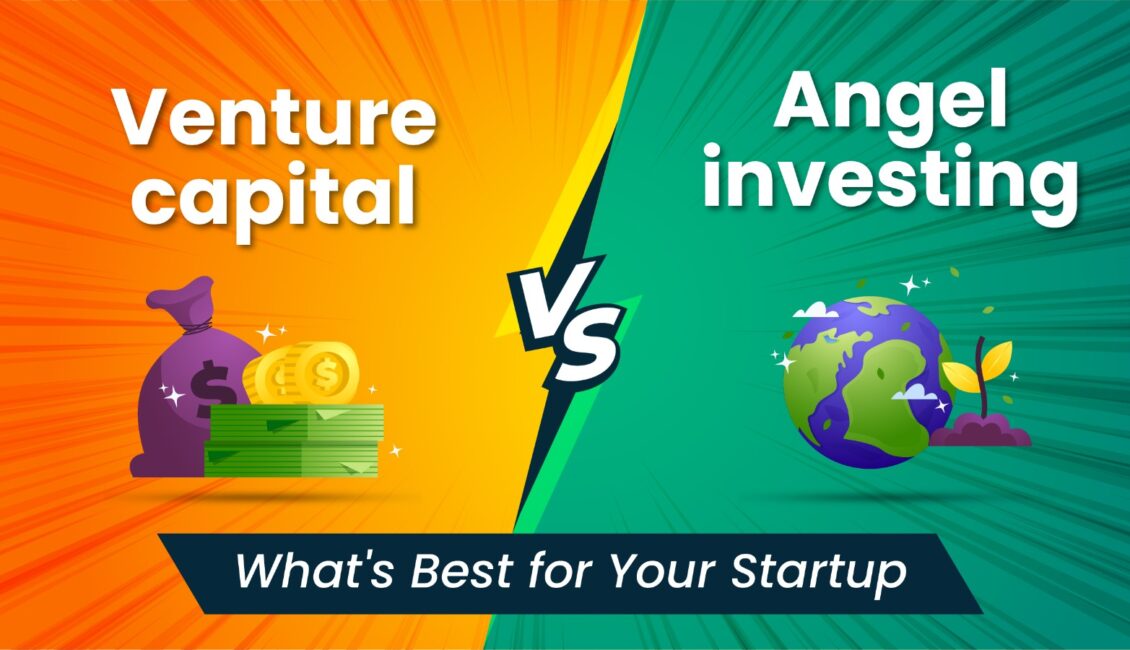
Scaling a business needs some finance, yet deciding what type works best for your startup is challenging. You might have heard of venture capital and angel investing. But what does it mean, or how does it work? Which one of these two is suitable for startups?
These are a few of the most common questions a new entrepreneur may want to ask. Well, this blog aims to ease that dilemma for you.
So, let’s discuss the age-old debate of venture capital vs angel investing for startups. By the end, you’ll understand the meaning of angel investing and venture capital and how to decide what is suitable for your startup.
Venture Capital vs Angel Investing
Before we get to the nitty gritty difference between venture capital funding and angel investment, let’s learn what venture capital and angel investors mean.
Venture Capital
Venture capital is a financial institution that pools money from diverse investors in return for a particular interest. These venture capital firms invest this money into promising startups to gain returns in the form of equity and higher positions in the startup’s board members. Their main objective is to help promising startups with market presence get better returns.
Angel Investment
Angel investment comes from individual angel investors. These angel investors are HNI or experts from diverse industries, extending their funds and experience to help the startups in return for some interest or equity. Angel investors offer seed funding for startups, even those who lack MVP.
Pros and Cons of Venture Capital
Pros
1. Large Capital
Venture capital firms can raise money from diverse sources like HNI and other investors. Therefore, they are capable of making significant investments for good returns. You can approach venture capital with your pitch if you need substantial capital for your startup.
2. Get Industry Experience & Advice.
Venture capitalists are accountable for providing promised returns to their clients. Therefore, they work to make the startup succeed and grow to gain profits. Often, venture capital firms have teams of experts in specific fields who provide the necessary advice to boost startup growth.
3. Network Exposure
Venture capital for startups brings more than venture investment and expert advice. They bring with them their network—a network including experts from the industry, fellow startup founders, and more investors. You can leverage your association for expert advice, find potential partners, and raise funds when needed.
Cons
1. Dilution of Equity
Venture Capital, most of the time, comes at the cost of equity. When you raise a significant amount, you’ll risk your equity and ownership of the startup. It can result in a dilution of decision-making control as the startup founder.
2. High Expectation of Return
Venture capital puts more pressure on better performance as they commit to their clients. Therefore, pressure to perform, grow the startup, and generate good returns could be too much for many startups.
3. Control on Operations
Venture capital investment is on a large scale. So, they ask for significant control in the startup management and operations. The situation can escalate into conflict in case of disagreement.
Pros and Cons of Angel Investing
Pros
1. Easy Funding for Early-stage Startup
Generally, angel investing happens during early-stage startups, where they have the idea and probably have no MVP. The angel investment can become the seed funding for startups.
2. Flexibility In Terms of Authority
Angel investors are known for giving startups more freedom. They can either ask for returns on their investment or equity. However, the share of equity might be lower than VCs.
3. Personal Mentorship
Angel investors are HNIs or experts who want to support budding startups. Angel investors will give you the startup funding and strategic advice to help you grow. They could also be part of an angel investor network where you can make connections for your startup.
Cons
1. Limited Funding
The angel investors are often solo HNI and experts from specific industries. So, there is a higher cap on their investment. It can hinder your growth if you need more investment.
2. Limited Industry Insights
There is a high chance that the angel investor is an HNI (high net-worth individual). They might need more industry experience to help you with business matters.
3. Risk from Potential Conflict
The expectations of the angel investor and startup founders could be different. Thus, any disagreement can lead to conflict and even pulling out of investment.
These were the basics for venture capital and angel investing. Both have their perks and drawbacks. Now we will discuss how you can compare both to find what suits your needs from venture capital vs angel investing.
Factors to Consider
To decide whether to choose venture capital or angel investing for investment there are a few factors you must consider:
-
Startup Stage
The stage of your startup is crucial to make the final decision. Venture capital often works with established startups or those with at least promising futures, stats, and success to make their claim. On the other hand, angel investing is for the startup at an early stage where they are still figuring things out. Angel investment is suitable for raising startup seed funding, while VC is better for more established ones.
-
Capital Fund Needed
VC can help you with higher funding needs, while angel investing offers a comparatively lower amount for startup investment.
-
Control of Ownership
The control of ownership is a concern with both types of startup investors. However, VC is more likely to hold a tight grip on decision-making than angel investors.
-
Industry and Network Exposure
Venture capital invests in startups to help them grow and gain profit from them. Therefore, they offer a team of experts for guidance and exposure to the industry and their network for the startup to grow. It is the same for the angel investors; ideally, they are a part of the angel investor network and help you succeed. However, angel investors may need more industry knowledge to help your startup.
Think carefully to decide what factors matter to you the most and decide on whom to reach for startup funding.
Conclusion
Raising startup funding is a tricky situation. It is crucial to consider factors discussed above before raising funds. Venture Capital and Angel Investing are two prominent types of startup investors in the market.
Venture capital is known to invest significant capital in established startups in return for equity and a firm hold on the board. On the other hand, angel investing deals with early-stage startups to help them grow. They would either ask for interest in return or equity.
Angel investors are often accessible with control over decision-making. While VC has a system to help you grow, angel investors usually need more industry experience. You need to decide based on your need for capital, the amount of ownership dilution you are okay with, and the exposure and support you need from the investor.
FAQ
What are the ways to raise startup funding?
You can raise startup funding in various ways. It includes pitching privately to VCs and angel investors, participating in pitching and networking events, and working with startup accelerators.
Where to find angel investors for startups?
You can find an angel investor network where you can access a list of angel investors. 21BY72 is an angel investor network that bridges the gap between investors and startups. We organize startup networking events that offer the perfect opportunity for you to pitch your startup and grow your network.
What are the critical differences between Venture Capital and Angel Investing?
While they offer startup funding, there are a few differences between them. Venture capital is a firm that pools funds from others in exchange for assured returns. They often seek more control over equity and decisions to ensure more profits in an established startup. On the other hand, angel investing is carried out by a single individual who can be an expert in the industry or an HNI. They invest in return for some interest or a lower amount of equity









